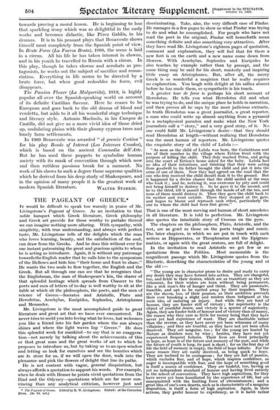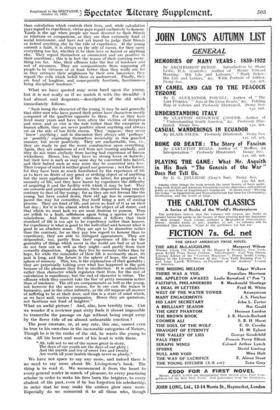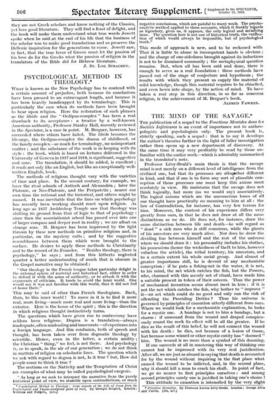THE PAGEANT OF GREECE.*
FT would be difficult to speak too warmly in praise of Mr. Livingstone's Pageant of Greece. As an invitation to that noble banquet which Greek literature, Greek philosophy and Greek art provide for those worthy to partake thereof we can imagine nothing more alluring. With sympathy, with simplicity, with true understanding, and always with perfect taste, Mr. Livingstone tells of the delights which the man who loves learning, beauty, and the satisfaction of the soul, can draw from the Greeks. And he does this without ever for one instant patronizing the great and gracious spirits to whom he is acting as introducer. Again, it is without any patronage towards the English reader that he calls him to the symposium of the Hellenes and bids him "their home and feast to share." He wants the two souls to flow together, the English and the Greek. But all through one can see that he recognizes that the Englishman, the man of Shakespeare's kin, the sharer of that splendid heritage which spreads from Chaucer to the poets and men of letters of to-day is well worthy to sit at the table at which sit the philosophers, the poets, and the men of science of Greece—Socrates and Aristotle, Plato and Herodotus, Aeschylus, Euripides, Sophocles, Aristophanes and Menander.
Mr. Livingstone is the most accomplished guide to great literature and great art that we have ever encountered. He never tries to scold you into loving what he loves, but welcomes you like a friend into his fair garden where the sun always shines and where the light waves lisp "Greece." He does this splendid work for mankind—to say that is no exaggera- tion—not merely by talking about the achievements of this or that great man and the great works of art to which he proposes to introduce us, but by taking us to an open window and letting us look for ourselves and see the beauties which are in store for us, if we will open the door, walk into the pleasance and pick the flowers of delight that line its paths.
He is not content with vague, general disquisition, but always affords a quotation to support his words. For example, when he deals with Homer he prints vivid quotations from the Iliad and the Odyssey—quotations which are far more con- vincing than any analytical criticism, however just and
• The Pageant of Oreeee. Edited by R. W. Livingstone. Oxford: at the Clarendon Press. t3d. =Li
discriminating. Take, also, the very difficult case of Pindar. He manages in a few pages to show us what Pindar was trying to do and what he accomplished. For people who have not read the poet in the original, Pindar will henceforth mean something definite and also something very attractive. After they have read Mr. Livingstone's eighteen pages of quotation, comment and explanation, they will feel that for them a new foot is on the earth and a new name come down from Heaven. With Aeschylus, Sophocles and Euripides he also teaches, by example rather than by precept, and the same thing may be said for his short, masterly and inspiring little essay on Aristophanes. But, after all, the merry Greek is so wonderful a magician that he really requires no explanation. You laugh with delight at his sallies almost before he has made them, so sympathetic is his touch.
A greater tour de force is perhaps his short account of Herodotus. He tells you what Herodotus did and what he was trying to do, and the unique place he holds in narration, and then proves all he says by the most judicious extracts. In truth Herodotus was a great journalist, a great reporter, a man who could write up almost anything from a pyramid to a metaphysical paradox and make what the New York journalists call a "story," and a very good story, of it. No one could fulfil Mr. Livingstone's desire—that they should read Herodotus at length—without realizing that Herodotus was the most human of reporters. Mr. Livingstone quotes the exquisite story of the child of Labda :—
" As soon as the child of Labda was born, the Corinthians sent ten of their number to the village where Eetion lived with the purpose of killing the child. They duly reached Petra, and going into the court of Eetion's house asked for the baby. Labda had no idea of their intentions, and thinking that they were acting from goodwill to its father brought the child and put it into the arms of one of them. Now they had agreed on the road that the one who first received the child should dash it to the ground. But it happened by a divine chance that the child smiled at the man who took it ; and he, noticing it, was overcome by pity and could not bring himself to destroy it. So he gave it to the second, and he to the third, till it passed through the hands of all the ten, and none of them would destroy it. Then they gave the child back to its mother and went outside. There they stopped at the gate, and began to blame and reproach each other, particularly the one to whom the child had been first given."
That is one of the most moving and human of short anecdotes in all literature. It is told to perfection. Mr. Livingstone also quotes the inimitable story of Croesus on the pyre.
The chapters on the philosophers, Plato, Aristotle, and the rest, are as good as those on the poets tragic and comic. The later chapters, in which we are put in touch with such writers as Hippocrates, or Theophrastus and the Epigram- matists, or again with the great orators, are full of delight.
In the invitation to read Aristotle we get few or no quotations from the Politics. Most memorable is the magnificent passage which Mr. Livingstone quotes from the Rhetoric, describing the characteristics of the young and ot
the old :—
" The young are in character prone to desire and ready to carry any desire they may have formed into action. They are changeful, too, and fickle in their desires, which are as transitory as they are vehement, for their wishes are keen without being permanent, like a sick man's fits of hunger and thirst. They are passionate, irascible, and apt to be carried away by their impulses. They are the slaves, too, of their passion, as their ambition prevents their ever brooking a slight and renders them indignant at the mere idea of enduring an injury. And while they are fond of honour, they are fonder still of victory ; for superiority is the object of youthful desire, and victory is a species of superiority. Again, they are fonder both of honour and of victory than of money, the reason why they care so little for money being that they have never yet had experience of want. They are charitable rather than the reverse, as they have never yet been witnesses of many villainies ; and they are trustful, as they have not yet been often deceived. They are sanguine, too ; for the young are heated by Nature as drunken men by wine ; besides, they have not yet experienced frequent failures. Their lives are lived principally in hope, as hope is of the future and memory of the past, and while the future of youth is long, its past is short ; for on the first day of life the field of memory is empty, the field of hope infinite. For the same reason they are easily deceived, as being quick to hope. They are inclined to be courageous ; for they are full of passion, which excludes fear, and of hope, which inspires confidence, as anger is incompatible with fear, and the hope of something good is itself a source of confidence. They are bashful, too, having as yet no independent standard of honour and having lived entirely m the school of convention. They have high aspirations, for they have never yet been humiliated by the experience of life, but are unacquainted with the limiting force of circumstances ; and a great idea of one's own deserts, such as is characteristic of a sanguine disposition, is itself a form of high aspiration. Again, in their actions, they prefer honour to expediency, as it is habit rather
than calculation which controls their lives, and, while calculation pays regard to expediency, virtue pays regard exclusively to honour. Youth is the age when people are most devoted to their friends or relations or companions, as they are then extremely fond of social intercourse, and have not yet learnt to judge their friends or indeed anything else by the rule of expediency. If the young commit a fault, it is always on the side of excess, for they carry everything too far, whether it be their love or hatred or anything else. They regard themselves as omniscient and are positive in their assertions ; this is in fact the reason of their carrying every- thing too far. Also, their offences take the line of insolence and not of meanness. They are compassionate from supposing all people to be virtuous or at least better than they really are, for as they estimate their neighbours by their own innocence, they regard the evils which befall them as undeserved. Finally, they are fond of laughter, and consequently facetious, facetiousness being disciplined insolence."
What we have quoted may seem hard upon the young, but it is not really so if we match it with the dreadful—I had almost said desperate—description of the old which immediately follows.
"Such being the character of the young, it may be said generally that elder men who have passed their prime have characters mostly composed of the qualities opposite to these. For as they have lived many years and have been often the victims of deception and error, and as vice is the rule rather than the exception in human affairs, they are never positive about anything and always err on the side of too little excess. They 'suppose,' they never know ' anything ; and in discussion they always add 'perhaps' or 'possibly,' expressing themselves invariably in this guarded manner, but never positively. They are uncharitable, too, i.e., they are ready to put the worst construction upon everything. Again, they are suspicious of evil from not trusting anybody, and they do not trust anybody from having had experience of human wickedness. Hence, too, they have no strong loves or hatreds ; but their love is such as may some day be converted into hatred, and their hatred such as may some day be converted into love. Their temper of mind is neither grand nor generous ; not the former, for they have been so much humiliated by the experience of life as to have no desire of any great or striking object or of anything but the mere appliances of life ; nor the latter, for property is a necessity of life, and they have learnt by experience the difficulty of acquiring it and the facility with which it may be lost. They are cowards and perpetual alarmists, their disposition being exactly contrary to that of the young ; for as they are not fervent like the young, but have cooled, down, their old age has in consequence paved the way for cowardice, fear itself being a sort of cooling process. They are fond of life, and never so fond of it as on their last day ; for it is the absent which is the object of all desire, and that which we most lack we are most desirous to possess. They are selfish to a fault, selfishness again being a species of mean- mindedness. And from their selfishness it follows that their standard of life is too apt to be expediency rather than honour, for expediency is what is good to the individual and honour what is good in an absolute sense. They are apt to be shameless rather than the contrary, for as they pay less regard to honour than to expediency, they are able to disregard appearances. They are despondent, too, partly from their experience of life—for the generality of things which occur in the world are bad or at least do not turn out so well as they might—and partly from their cowardly disposition. Again, they live by memory rather than by hope, for while the remainder of their life is necessarily short, its past is long, and the future is the sphere of hope, the past the sphere of memory. This, too, is the explanation of their garrulity ; they are perpetually talking over what has happened in the past because of the pleasure they feel in recollection. It is calculation rather than character which regulates their lives, for the end of calculation is expediency, but the end of character is virtue. The offences which they commit take the line of petty meanness rather than of insolence. The old are compassionate as well as the young, not however for the same reason, for in one case the reason is humanity, and in the other infirmity, as the old suppose all manner of suffering to be at their door, and this is a state of mind which, as we have said, excites compassion. Hence they are querulous, not facetious nor fond of laughter."
What an awful picture ! And, alas, how terribly true. Can we wonder if a reviewer past sixty finds it almost impossible to transcribe the passage on Age without being swept away by the fierce tide of an almost unbearable emotion ?
The poor creature, or, at any rate, this one, cannot even be true to his own class in the inexorable categories of Nature, Though he is in the ranks of the old, he wants the young to win. All his heart and most of his head is with them.
" Ah, talk not to me of the names great in story, The days of our youth are the days of our glory ; And the myrtle and ivy of sweet two and twenty Are worth all your laurels though never so plenty."
We have not space to say any more, and indeed there is no need to say more about Mr. Livingstone's book. The thing is to read it. We recommend it from the heart to every general reader in search of pleasure, to every practising scholar in order to make his fires burn the brighter, to every student of the past, even if he has forgotten his scholarship, in order that he may. make the embers glow once more. Especially do we commend it to all those who, though they are not Greek scholars and know nothing of the Classics, yet love good literature. They will find a feast of delight, and the book will make them understand what true words Jowett spoke when he said at the end of his life that the business of the scholar was to make good translations and so preserve the Hellenic inspiration for the generations to come. Jowett saw, in fact, that the true lover of Greece must let the passion of his love do for the Greeks what the passion of religion in the translators of the Bible did for Hebrew literature.
J. Sr. LOE STRACHEY.




























































 Previous page
Previous page